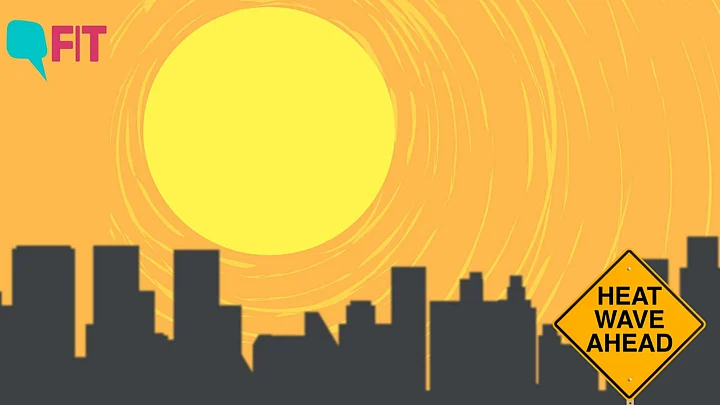With temperatures increasing and summer fast approaching, the Union Ministry of Health has released a set of guidelines to prevent heat-related illnesses.
On Wednesday, 3 April, the Ministry, in a post on social media platform X (formerly Twitter), wrote,
“Union Health Minister, Dr @mansukhmandviya, held a review meeting today with stakeholders to assess their preparedness in tackling heat-related illnesses stemming from heat waves, and to discuss the action plan for the upcoming summer season.”
Health Minister Dr Mansukh Mandaviya said, “continuous efforts towards generating awareness for people for better management of heatwaves is necessary as effective address leads to effective management.”
This comes days after the India Meteorological Department (IMD) sounded an alert for heat waves and “extreme heat conditions” in the country between April and June.
The IMD, in its forecast, issued a heat wave warning for South Bengal, Karnataka, Tamil Nadu, and Goa, among other states.
FIT spoke to experts to understand what you can do to protect yourself from extreme heat. But first, here’s a breakdown of the government-issued guidelines.
What do the guidelines say?
The guidelines released by the union government, advises people to “stay hydrated, block direct sunlight, avoid activity in the sun, and avoid going out” during the afternoon.
The health ministry also recommended that people take special care and monitor the health of people who might be vulnerable due to age or low immunity.
Apart from the Centre, Karnataka also released guidelines for the state, following the IMD’s warning.
A circular by the Karnataka State Disaster Management Authority asked people to:
Stay hydrated and drink water
Avoid carbonated beverages
Seek medical consultation if you feel dizzy
“IMD has indicated that the upcoming hot weather in Karnataka will be above normal during April-May 2024. The forecast increase in temperature is likely to exceed normal heatwave days across the state by 2-14 days. Swelling and fainting are usually accompanied by fever below 102 degrees Fahrenheit, causing heat cramps."Karnataka government circular
It adds that sunstroke can be identified with symptoms like body temperature rising to 104 degrees Fahrenheit or higher and changes in breathing and loss of consciousness.
The Karnataka government has also directed district officials to help provide drinking water facilities in public places, and supply tankers to places that are facing a shortage.
Can heat waves impact your health?
Yes. Dr Saibal Chakravorty, Senior Consultant, Internal Medicine, Metro Hospital, Noida, explains to FIT that there are three ways in which heat impacts our health:
Heat exhaustion
Heat cramps
Dr Pankaj Chaudhary, Senior Consultant, Internal Medicine, Max Hospital, Vaishali, agrees with Dr Chakravorty.
He adds, “When a patient is exposed to high temperatures, even if it is just for a few minutes, it can be risky since our bodies are not used to it.”
Both the doctors tell FIT that severe or excessive heat exposure can lead to:
Unconsciousness or fainting
Hospitalisation
Kidneys shutting off
Brain damage
Dr Chaudhary adds, “In some cases, severe heat can also be fatal.”
Only last week, a report by Down To Earth also suggested that “there may be humid heatwaves close to the human survivability threshold of heat stress already occurring in India.”
Who is at risk?
According to Dr Chakravorty, “Heat can impact people differently depending on the length of exposure – prolonged exposure can cause severe consequences.”
But, Dr Chaudhary adds that people who have a lower immunity are more vulnerable to heat-related illnesses.
Older people, children, people who have comorbidities and chronic diseases – for instance, diabetes, lung, or heart diseases – are also at a greater risk.
Anyone suffering from a heat-related condition can have these symptoms:
Restlessness
Cramps in lower limbs
Excessive sweating
Dehydration
Headache
Lethargy and fatigue
Swelling
Rashes
What are the health-related precautions that people should be taking during heat waves?
Both the experts that FIT spoke to suggest some preliminary measures that people can take when the temperatures are rising.
Try to avoid heat exposure, especially for prolonged periods.
Increase your fluid intake to stay hydrated – consume water, coconut water, buttermilk, fruit juices, ORS, etc.
Avoid soft drinks or beverages that can lead to dehydration.
When the sun is at its peak, don’t step outside or try to be in cooler areas.
Wear lighter clothes, caps/hats, sun goggles, and sunscreen.
Don’t exercise or run outside when the sun is at its peak.
“But there are also people who don’t have a choice but to step out of their homes – like labourers, construction workers, or people with field jobs. For them, we suggest carrying a bottle of water and ORS. Keep hydrated, and try to find places with shade. If you feel unwell, consult a doctor without delay.”Dr Pankaj Chaudhary

